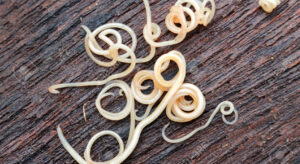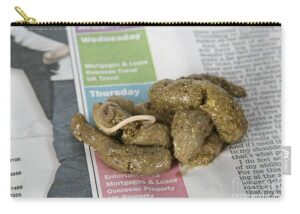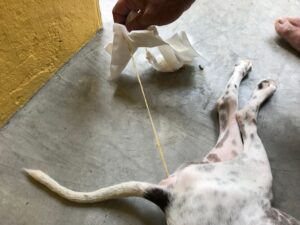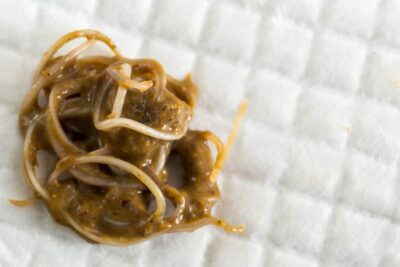How long will my puppy poop worms after deworming? This is a common question among pet owners who have recently dewormed their puppies. Deworming helps to eliminate and prevent the presence of intestinal worms. However, after deworming, it is not unusual for puppies to continue passing small amounts of worms in their stool. We will delve into the duration of this process, providing detailed information.
Generally, you can expect your puppy to pass worms for several days to a few weeks after deworming. However, the number of worms passed in the stool should decrease over time and stop after the treatment’s end or after a few weeks.
It’s good to remember that deworming is not a one-time solution and that puppies may need to be treated multiple times to eliminate worms.
In addition, while deworming can help eliminate adult worms, it may not kill all of the worms’ eggs. As a result, puppies may pass small amounts of worms in their stool for several weeks after treatment.
How long will my puppy poop worms after deworming?

The length of time a puppy may continue to pass worms after deworming can vary depending on the type of worm and the effectiveness of the medication used. On average, it can take a few days to a week for all the worms to be eliminated from the puppy’s system.
However, the treatment can take up to 2 weeks to completely clear the worms. It’s important to follow your veterinarian’s instructions and schedule follow-up deworming treatments if needed. It is also essential to maintain a regular deworming schedule as recommended by your veterinarian, which can be every 2-3 months or more frequently, depending on the puppy’s exposure to potential sources of infection.
You must also maintain good hygiene and sanitation to prevent reinfection, such as regularly cleaning up feces and keeping the living area clean. It’s worth noting that if your puppy is still passing worms or if you notice any other signs of illness, such as vomiting, diarrhea, or loss of appetite, then seek further medical advice.
What are common types of worms in puppies?
Common types of worms in puppies include roundworms, hookworms, and tapeworms. Puppies can also be infected with whipworms and heartworms, but these are less common. These worms can be transmitted through the mother’s milk, contact with contaminated soil or feces, or through insect vectors such as fleas.
It is essential to consult a veterinarian for a proper diagnosis and treatment. Regular deworming and preventive measures, such as keeping the puppy‘s environment clean and controlling fleas, can help prevent worm infections.
What are the symptoms of worm infestation in puppies?

Symptoms of worm infestation in puppies can include diarrhea, vomiting, weight loss, a dull coat, and a pot-bellied appearance. Puppies may also have a poor appetite and may seem weak or lethargic. In severe cases, symptoms of worm infestation in puppies can include the following:
- Blood in stool: This can signify a heavy infestation, as worms can cause irritation and bleeding in the intestinal tract.
- Anemia: Worms can suck blood from the puppy’s intestinal lining, leading to a decrease in red blood cells. Anemic puppies may have pale gums and a weak pulse.
- Coughing: Some types of worms, such as lungworms, can migrate to the lungs and cause coughing or difficulty breathing.
- Scooting or rubbing their bottom on the ground: This can be caused by worms in the intestines or anus, which can cause itching and discomfort.
It’s important to note that some puppies may not show any symptoms but still have worms. Regular check-ups and deworming with a veterinarian is the best way to ensure your puppy is healthy and worm-free.
How often should puppies be dewormed?
Puppies should be dewormed regularly during their first few months of life. The exact schedule will depend on the specific type of worms and the puppy‘s risk factors.
A typical deworming schedule for puppies may include the following:
- Deworming at 2, 4, 6, and 8 weeks of age
- Deworming every 2-4 weeks until the puppy is 3-6 months old.
- Deworming every 3-6 months as an adult.
It is essential to consult with a veterinarian to establish a deworming schedule that is appropriate for your puppy. The veterinarian will consider the puppy’s breed, environment, and lifestyle to determine the best deworming plan.
What are the side effects of deworming in puppies?

The side effects of deworming in puppies can vary depending on the type of medication used, the puppy’s health, and the severity of the infestation. Some common side effects of deworming in puppies include:
- Digestive upset: Some puppies may experience vomiting, diarrhea, or loss of appetite after deworming. These side effects are usually mild and short-lived.
- Allergic reactions: In rare cases, puppies may be allergic to the deworming medication. Symptoms can include hives, itching, and difficulty breathing.
- Anemia: Some types of worms, such as heartworms, can cause anemia in puppies. Deworming can cause a sudden release of these worms and worsen anemia.
- Lethargy: Some puppies may feel tired or weak after deworming, particularly if they have a heavy infestation.
- Worm segments in stools: You may notice small segments of dead worms in the puppy’s feces after deworming. This is normal and is a sign that the medication is working.
How long does it take for deworming to take effect in puppies?
Some deworming medications work quickly and can kill worms within a few hours of being administered. Others may take a few days or weeks to eliminate the infestation.
In general, it is crucial to follow the dosage and frequency instructions of the medication given by the veterinarian. The veterinarian will also advise on when to provide the next dose of medicine or when to schedule a follow-up appointment to check for remaining worms.
Also, ensure that deworming medication only kills adult worms and may not be effective against immature worms or eggs. We may need repeat doses of medication to eliminate all worms and their eggs from the puppy’s system. Always remember deworming is not a one-time solution; you Should establish regular check-ups and follow-up deworming schedules to prevent future infestations.
Additionally, deworming medication will not prevent a new infestation, it only eliminates the current one. Therefore, it is crucial to take preventive measures such as:
- Keeping your dog’s living area clean and free of feces
- Not letting your dog eat or play with feces.
- Keeping your dog away from places where other dogs have been, as worms can easily be transmitted from one dog to another.
- Regularly washing your dog’s food and water bowls
Most importantly, deworming medication is not a substitute for good hygiene and sanitation practices. A combination of both deworming medication and good hygiene practices is necessary to keep your puppy healthy and free of worms.
How long will a puppy continue to pass worms after deworming?

A puppy may pass worms for a few days after deworming, as the medication kills the adult worms and the puppy’s body expels them. The exact time frame can vary depending on the type of worms and the drug used. It is normal to see small segments of dead worms in the puppy’s feces, indicating that the medication is working.
However, you must contact your veterinarian if you continue to see live worms in the feces or if the puppy is still showing symptoms of worm infestation (such as diarrhea or vomiting).
One thing is sure, deworming medication only kills adult worms and may not be effective against immature worms or eggs. We may need repeat doses of medication to eliminate all worms and their eggs from the puppy’s system.
It is essential to follow the instructions and dosage of the medication the veterinarian gives and schedule follow-up appointments to check for remaining worms. And it’s also necessary to take preventive measures such as maintaining good hygiene and sanitation practices to prevent re-infestation.
Is it normal for puppies to pass worms after deworming?
It is usual for puppies to pass worms after deworming, as the medication kills them and expels them from the body. This can happen within a few hours to a few days after treatment.
However, deforming medication may only target specific types of worms, so multiple rounds of deworming may be necessary to eliminate all kinds of worms. Always remember that good hygiene practices such as keeping the living area clean, providing clean water and food, and regular grooming can help prevent reinfection.
What to do if a puppy continues to pass worms after deworming?

If a puppy continues to pass worms after deworming, it is essential to consult a veterinarian. The vet can diagnose the type of worms present and determine if the medication used was appropriate and effective. They may also recommend additional deworming treatments or other drugs to eliminate the worms.
Sometimes, different medications may be necessary to treat the worms effectively. Also, take steps to prevent reinfection, such as maintaining good hygiene practices in the living area, providing clean water and food, and regularly grooming the puppy. The vet may also recommend a follow-up fecal exam to ensure that all the worms have been eliminated.
Other things to consider include the following:
- Puppies can easily pick up worms from their mother or the environment, so it is vital to ensure that all puppies in the litter and their mother are treated simultaneously.
- Puppies should be dewormed regularly according to the schedule recommended by the vet, usually at 2, 4, 6, and 8 weeks of age, and then every 3 months until 6 months of age.
- Puppies exposed to high-risk environments, such as kennels, shelters, or breeding facilities, may require more frequent deworming.
Can puppies become reinfected with worms after deworming?
Puppies can become reinfected with worms after deworming. Can quickly spread worms through the environment through contact with infected feces or the mother’s milk.
Reinfection can happen if the puppy is not kept in a clean environment, if the puppy is allowed to roam and come into contact with infected feces, or if the puppy is not dewormed regularly according to the schedule recommended by the vet.
Additionally, some worms have a complicated life cycle, which can be hard to eliminate with just one round of deworming.
Moreover, good hygiene practices such as keeping the living area clean, providing clean water and food, and regular grooming can help prevent reinfection. If you notice your puppy passing worms after deworming or have any concerns about their health, consult a veterinarian for proper diagnosis and treatment.
How to prevent worm infestation in puppies?

Preventing worm infestation in puppies can be done through good hygiene practices, regular deworming, and proper care. Here are some steps you can take to prevent worm infestation in puppies:
1. Keep the living area clean: Regularly clean and disinfect the living area, including the puppy’s bedding, food and water bowls, and any other surfaces that the puppy comes into contact with.
2. Provide clean water and food: Ensure the puppy has access to clean, fresh water at all times, and feed them high-quality, nutritious food.
3. Regular grooming: Regularly groom the puppy, including brushing its coat and trimming its nails. This can help remove any dirt or feces that may contain worm eggs.
4. Deworming schedule: Follow the deworming plan recommended by your veterinarian, usually at 2, 4, 6, and 8 weeks of age, and then every 3 months until 6 months of age.
5. Keep away from infected feces: Keep your puppy away from other dogs’ feces, especially if you suspect they may be infected with worms.
6. Keep away from high-risk areas: Avoid areas where other dogs may have defecated, such as public parks, hiking trails, or beaches.
7. Control fleas and ticks: Regularly check your puppy for fleas and ticks, and use appropriate preventative measures to control them, as they can also transmit worms.
8. Consult your veterinarian: If you notice any worm infestation or have concerns about your puppy’s health, it is always best to consult a veterinarian for proper diagnosis and treatment.
How to maintain healthy intestinal flora in puppies after deworming?
Maintaining healthy intestinal flora in puppies after deworming is essential for overall gut health and immunity. Here are some steps you can take to maintain healthy intestinal flora in puppies after deworming:
1. Probiotics: Give your puppy a probiotic supplement to help repopulate the gut with beneficial bacteria. Probiotics can be found in supplements or certain types of food like fermented or yogurt.
2. Prebiotics: Feed your puppy a diet rich in prebiotics, which are non-digestible fibers that serve as food for beneficial bacteria in the gut. Some examples of prebiotic-rich foods include sweet potatoes, bananas, and oats.
3. Avoid antibiotics: Avoid giving your puppy antibiotics unless necessary, as these medications can disrupt the balance of bacteria in the gut.
4. Avoid processed food: Processed food may lack the beneficial bacteria and fibers that support a healthy gut. Feed your puppy a well-balanced diet rich in nutrients, vitamins, and minerals.
5. Gradual diet changes: Gradually change the puppy’s diet to avoid stomach upset or diarrhea.
6. Hydration: Make sure your puppy is well hydrated, as water helps maintain a healthy gut and support digestion.
7. Regular vet check-up: Regularly check up on your puppy with a veterinarian. They can help you monitor your puppy’s gut health; give you personalized advice and recommend a diet that fits your puppy‘s needs.
How to clean up after a puppy passes worms?
Cleaning up after a puppy passes worms can help prevent the spread of infection and maintain a clean and healthy environment for the puppy. Here are some steps you can take to clean up after a puppy passes worms:
1. Wear gloves: To protect yourself from contamination, wear disposable gloves when handling the worms or any feces that contain them.
2. Dispose of the worms properly: Pick them up with a disposable scoop or a piece of paper and place them in a sealed plastic bag. Dispose of the pack in a trash can with a tight-fitting lid.
3. Clean the area thoroughly: Use a disinfectant cleaner or a solution of water and bleach (1:32 ratio) to clean the area where found the worms. Be sure to clean any surfaces that may have come into contacts with the worms, such as the puppy‘s bedding or food and water bowls.
4. Launder the puppy’s bedding: If worms are found, launder them using hot water and detergent.
5. Vacuum the area: Use a vacuum cleaner to remove any remaining debris or eggs that may be present.
6. Dispose of the vacuum bag: Dispose of the vacuum cleaner bag in a sealed plastic bag and place it in the trash can with a tight-fitting lid.
7. Wash your hands: Be sure to wash your hands thoroughly with soap and water after handling the worms or cleaning the area.
How to know if a puppy is fully recovered from worm infestation?
Knowing if a puppy has fully recovered from a worm infestation can be determined by various factors. Here are some signs that a puppy may have fully recovered from a worm infestation:
1. No more worms in feces: The puppy should no longer pass worms in their feces after deworming. A follow-up fecal exam can confirm that all the worms have been eliminated.
2. Improved appetite and weight: Puppies with worms can have poor appetites and may lose weight due to the worms taking nutrients away from the host. After deworming, the puppy should have an improved appetite and gain weight.
3. Improved energy levels: Puppies with worms may be lethargic and have low energy levels. After deworming, the puppy should have more energy and be more active.
4. Normal bowel movements: Puppies with worms may have diarrhea or constipation. After deworming, the puppy’s bowel movements should return to normal.
5. No more signs of abdominal discomfort: Puppies with worms may have abdominal pain or distension due to the worms. After deworming, the puppy should no longer show signs of abdominal discomfort.
It is a fact that it may take some time for the puppy‘s gut to recover fully after deworming. In some cases, additional deworming treatments or other medications may be necessary to eliminate all types of worms.
Conclusion
How long will my puppy poop worms after deworming? As a result, it is normal for puppies to pass worms after deworming, as the medication kills them and expels them from the body. This can happen within a few hours to a few days after treatment.
Additionally, good hygiene practices such as keeping the living area clean, providing clean water and food, and regular grooming can help prevent reinfection. Suppose you notice your puppy passing worms after deworming or are concerned about their health. In that case, it is always best to consult a veterinarian for proper diagnosis and treatment.
Remember that deworming medication may only target specific types of worms, so multiple rounds of deworming may be necessary to eliminate all kinds of worms.
Remember that maintaining healthy intestinal flora in puppies after deworming is essential for overall gut health and immunity. Keep a healthy gut by giving probiotics, and prebiotics, avoiding antibiotics and processed food, changing the diet gradually, and monitoring the puppy’s hydration.
Lastly, cleaning up after a puppy passes worms is vital to prevent the spread of infection; use gloves, dispose of the worms properly, clean the area thoroughly, launder the puppy’s bedding, vacuum the site, and wash your hands.


